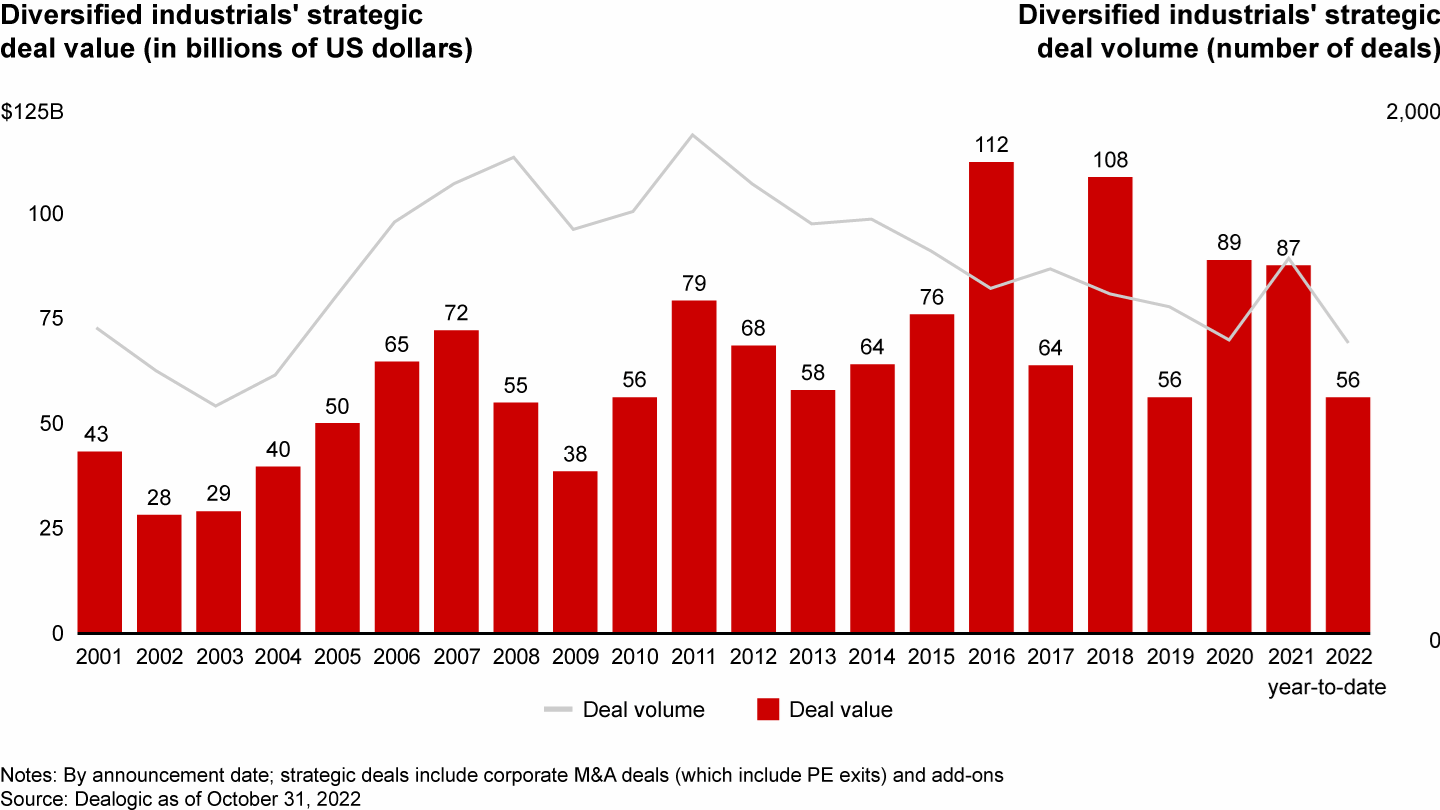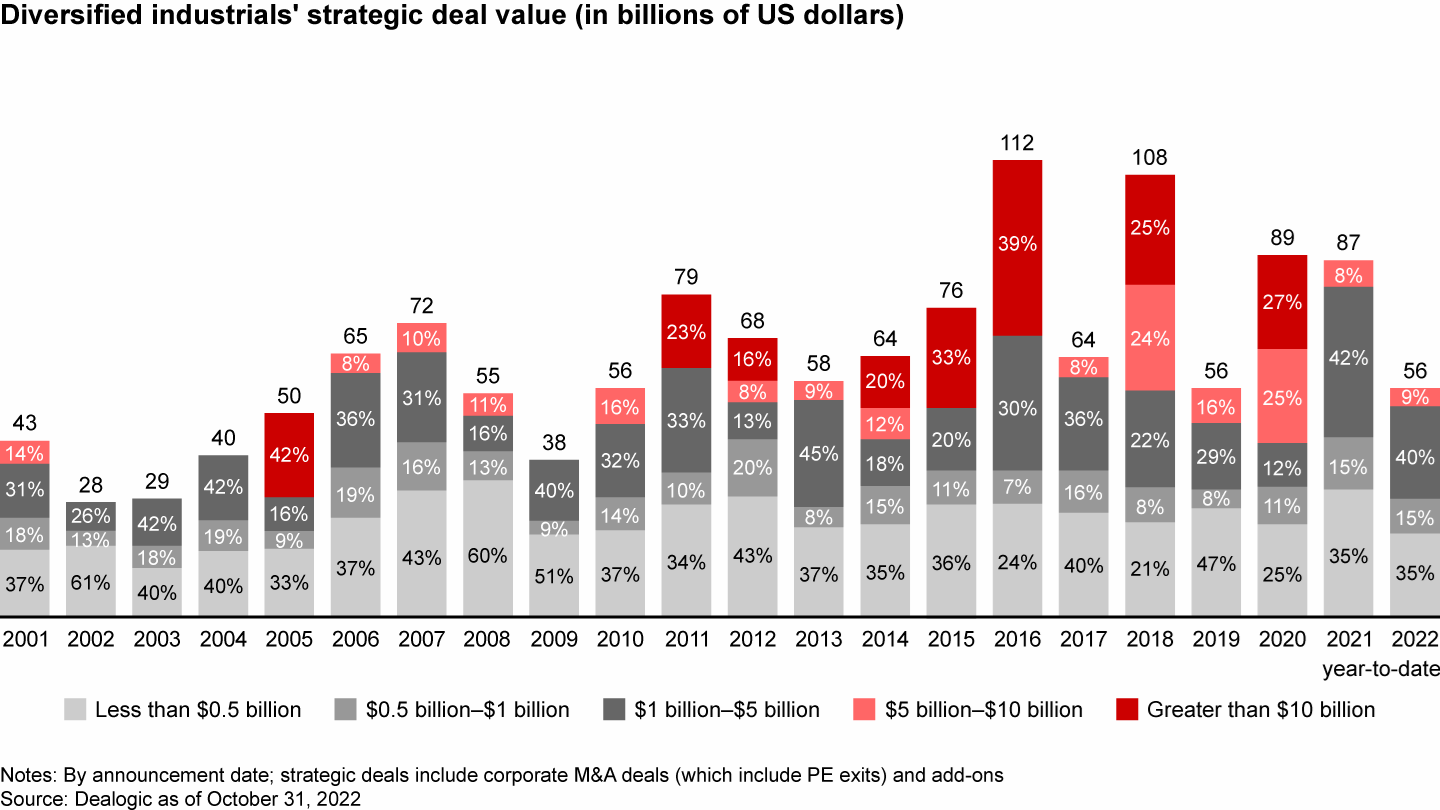M&A Report

At a Glance
- Diversified industrials’ overall strategic M&A value and volume declined in 2022.
- But acquisitions focused on helping companies meet their environmental and social targets are picking up steam.
- Industrial players bought quick access to favorable green markets, and they acquired capabilities to accelerate reductions in water and carbon usage.
- To support such deals, link corporate strategy with the M&A roadmap, focus diligence on what will drive growth, and tailor the integration thesis to each specific deal.
This article is part of Bain's 2023 M&A Report.
While the macroeconomic uncertainty of 2022 caused the volume of industrial company deals to drop from its six-year high in 2021, and while few deals even came close to the $5 billion or greater value that represented more than half of all industrial M&A in 2020, there was one type of activity that grew in popularity—namely, deals that promised to push companies farther along on their environmental, social, and corporate governance (ESG) journeys (see Figures 1 and 2).
Diversified industrials’ deal volume fell from 2021’s six-year high in 2022


More than half of all diversified industrials' strategic deal value came from deals valued at greater than $5 billion in 2020


Overall deal transactions are down, but we see an increasing number of ESG-driven acquisitions among industrial players looking to accelerate broader environmental and social objectives. While it’s hard to quantify M&A activity based on ESG dimensions, we believe that 1 in 10 deals in diversified industrials now has an ESG component, more than the average across all industries. As ESG priorities continue to take mindshare of CEO and board agendas, industrial players are actively pursuing deals to accelerate capability acquisitions. As a result, two major trends are emerging in ESG-led acquisition plays.
First, industrial players are acquiring adjacent businesses that quickly grant access to favorable market segments. Similar to auto companies’ entry into batteries to help accelerate electric vehicle development, so, too, are industrial players looking to gain quick access to new green markets.
For example, Canadian engineering, procurement, and construction company SNC-Lavalin set aggressive decarbonization and sustainability targets as part of its engineering net-zero ambitions. To achieve these objectives, the company acquired Flex Process, a leading digital process simulation player that helps optimize asset life and reduce emissions for customers across the industrial, chemical, and power industries. Rising attention to address and report on decarbonization is creating an attractive market for remediation efforts. The acquisition helped rapidly accelerate SNC-Lavalin’s technology capabilities to become a meaningful player in the growing decarbonization segment of remediation, as opposed to relying on internal R&D to build the necessary tech stack requirements. SNC-Lavalin had a clear link between its broader strategic objectives and M&A roadmap, a critical factor when building capabilities away from the base business.
Companies are acquiring to improve production or manufacturing in pursuit of their own ESG objectives.
Second, companies are looking to acquisitions to help improve their production or manufacturing capabilities in pursuit of their own ESG objectives. For example, construction materials companies are pursuing innovative adjacent solutions to help address carbon footprint goals. Saint-Gobain’s acquisition of Chryso technologies introduced new additive solutions for sustainable construction into Saint-Gobain’s portfolio, helping to manage carbon emissions across its concrete manufacturing footprint. In addition to diversifying its portfolio, the acquisition helps Saint-Gobain improve existing product quality and capabilities, increasing synergies from the deal. In support of these scope deals, ESG is playing a bigger role in upstream diligence activities. In addition to market and synergy assessments, industrial players are broadening ESG diligence efforts (beyond traditional environmental studies) to inform acquisition plays and manage downside risk. Net-zero plans and sustainability announcements can materially impact deal valuations.
Evolving the industrial M&A playbook
As ESG priorities grow, companies will need to change their M&A approaches to ensure ESG-driven scope/capability deals are successful additions to their business portfolios. Pivoting M&A capabilities to support these types of deals will require three critical changes:
- proactively linking corporate strategy with the M&A roadmap;
- updating the diligence playbook, focusing on what matters to drive scope growth; and
- tailoring the integration thesis for each specific deal.
ESG pursuits cannot be an afterthought to M&A strategy.
A similar new playbook is required as companies look to marry ESG priorities with M&A strategy. ESG pursuits cannot be an afterthought to M&A strategy. Moving upstream in the process—that is, assessing gaps in current ESG strategy and partnerships to fill them while pursuing a robust ESG lens in diligence activities—will ensure that capability matches are complementary to strategic pursuits. Integrated ESG diligence and screening efforts also guarantee that ESG priorities are enmeshed with capability pursuits and therefore not just an afterthought.
Looking ahead, we expect momentum to slow for M&A activity within the industrial sector as long as market uncertainty and recessionary fears remain. Valuation uncertainty may continue to push industrial players into smaller targeted acquisitions to help shore up deal theses and continue expansion into ESG pursuits. Those willing to take a more proactive stance in the face of uncertainty will need to be focused on end-to-end management of the M&A value chain. Deals will require a clear strategic rationale, a well-defined deal and integration thesis, diligence across both cost and revenue synergies, stringent planning, realization, and follow-through of value creation post-close.